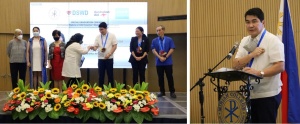
Fifty personnel of the Department of Social Welfare and Development (DSWD) received their Post-Graduate Diploma in Child Protection during the special graduation ceremony held on September 30 at the Henry Sy Innovation Center, Miriam College-Loyola Campus in Diliman, Quezon City.
Through the scholarship grants provided by the United Nations Children’s Fund (UNICEF), the social workers from the DSWD Central Office and Field Offices were able to take the Specialized Training Course on Child Protection cum Case Management facilitated by Miriam College.
The partnership of the DSWD, through its Social Welfare and Development Learning Institute (SWDLI), with UNICEF and Miriam College aimed at developing the competencies of child protection specialists of the Department at the national and regional levels, hence, contributing to the Ha Noi Declaration on Strengthening Social Work Towards Cohesive and Responsive ASEAN Community and strengthening the Technical Assistance and Resource Augmentation (TARA) function of the DSWD Local Government Units (LGUs) along child protection.
“Capacitating 50 social workers from the DSWD on child protection will indeed impact in the work to help children reach their full potentials,” Secretary Erwin T. Tulfo said during his speech.
The DSWD noted that this capacity-building activity is a landmark educational opportunity initiated by the DSWD-Social Welfare Institutional Development Bureau and Human Resource Management and Development Service, as SWIDLI’s Secretariat, to develop and expand the skills and knowledge of social workers in the implementation of child protection services.
“The added expertise and skills that you have gained from this engagement will greatly contribute to the fulfillment of the Department’s mandate,” the Secretary said directing his statement to the graduates. He also urged them to share their new found skills to their fellow public servants in their respective offices.
Secretary Tulfo expressed his gratitude to UNICEF and Miriam College for funding and supporting the social workers so they could finish their course with “flying colors.”
The DSWD, along with its partners, vowed to provide more opportunities to enhance the capacities of its workforce to enable them to continue to make a difference in the lives of the poor, vulnerable, and marginalized sectors. ###


